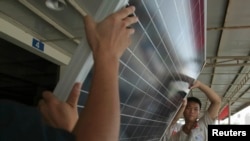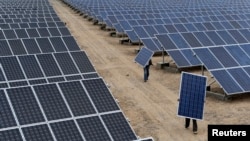BRUSSELS/BEIJING —
China's leadership transition is complicating talks to resolve a multi-billion-dollar dispute with the European Union over solar panels, pushing both sides closer to placing punitive tariffs on each others' exports and risking a trade war.
The newly-appointed chief of China's Communist Party Xi Jinping is set to take over the presidency at a national congress in March. But the full line-up of government officials is not yet in place and China's current commerce minister is likely to step down after what some have said was a political snub at the party's congress in November.
EU leaders want to avoid following the United States' decision last year to impose duties on Chinese solar power products, aware that Europe needs China to help it emerge from three years of economic crisis.
But EU officials and diplomats say they have made little progress, accusing the Chinese of "stonewalling," and are unable to get beyond the outgoing commerce minister, Chen Deming. They complain of a limbo in the ministry that will not end until after the March congress.
"There is no clarity on what the new leadership thinks about trade," said a senior EU official involved in talks with China. "They are stonewalling and the window of opportunity for a solution on solar panels is closing."
China's commerce ministry spokesman Shen Danyang told reporters in Beijing this week that officials are "conducting consultations and relevant response work with the concerned parties," but did not comment on any impact China's leadership transition is having on negotiations.
Germany, the United States and China are the world's biggest solar markets and companies are in a race to win contracts as countries seek to limit pollution and global warming.
In a non-binding vote, EU countries approved on Wednesday a request from industry to register solar panels from China, which would allow for retroactive measures if the European Commission agrees to registration and does impose duties.
But the Commission, the EU executive, denied on Thursday that the decision by member states signalled Brussels was closer to blocking Chinese solar products. "Let's not interpret this as suggesting anything - it is simply administrative procedure," EU trade spokesman John Clancy said in a statement.
Race Against Time
European solar panel manufacturers, led by Germany's Solar World, accuse their Chinese counterparts of receiving state subsidies to flood the EU with panels sold below cost and putting Europeans out of business to corner the market.
The Commission launched an investigation last September into Chinese solar panels, the biggest import sector it has ever targeted. China exported more than $25 billion worth of panels to the European Union in 2011.
Highlighting the risk of a trade war, Chinese solar companies also accuse the European Union of wrongdoing.
China says Europe illegally favors it domestic solar panel producers and Beijing is considering its own duties on EU exports of polysilicon, which is used to make solar panels.
Complicating things further, some European distributors and installers of Chinese panels say EU tariffs on China would be damaging for Europe's efforts to develop clean energy. They say solar energy is only efficient using Chinese products that are up to 45 percent cheaper than those made in Europe.
"Even without the [leadership] transition, this is a very difficult issue,'' said Scott Kennedy, director of the Research Center for Chinese Politics and Business at Indiana University. "I really don't see a negotiated outcome."
Time is of the essence because many expect Beijing to make a decision on polysilicon duties as soon as the end of February.
The EU's investigation must culminate in a decision by June.
In reality, that is likely to come by mid-April, when diplomats from the EU's 27 countries make their recommendation to the European Commission, which is handling the case.
Such a timeframe does not give a new trade minister in Beijing much time to get acquainted with the issues and reach a settlement. EU Trade Commissioner Karel De Gucht said there is no chance of tweaking the investigation's deadline.
"They know exactly what it is about, the solar panel case. We are consulting them, it is up to them," De Gucht told Reuters. "You cannot have something like a prolongation of that period because there is a transition in China."
In the past four years, the Commission has only chosen to end one trade defense case in China without imposing duties.
The newly-appointed chief of China's Communist Party Xi Jinping is set to take over the presidency at a national congress in March. But the full line-up of government officials is not yet in place and China's current commerce minister is likely to step down after what some have said was a political snub at the party's congress in November.
EU leaders want to avoid following the United States' decision last year to impose duties on Chinese solar power products, aware that Europe needs China to help it emerge from three years of economic crisis.
But EU officials and diplomats say they have made little progress, accusing the Chinese of "stonewalling," and are unable to get beyond the outgoing commerce minister, Chen Deming. They complain of a limbo in the ministry that will not end until after the March congress.
"There is no clarity on what the new leadership thinks about trade," said a senior EU official involved in talks with China. "They are stonewalling and the window of opportunity for a solution on solar panels is closing."
China's commerce ministry spokesman Shen Danyang told reporters in Beijing this week that officials are "conducting consultations and relevant response work with the concerned parties," but did not comment on any impact China's leadership transition is having on negotiations.
Germany, the United States and China are the world's biggest solar markets and companies are in a race to win contracts as countries seek to limit pollution and global warming.
In a non-binding vote, EU countries approved on Wednesday a request from industry to register solar panels from China, which would allow for retroactive measures if the European Commission agrees to registration and does impose duties.
But the Commission, the EU executive, denied on Thursday that the decision by member states signalled Brussels was closer to blocking Chinese solar products. "Let's not interpret this as suggesting anything - it is simply administrative procedure," EU trade spokesman John Clancy said in a statement.
Race Against Time
European solar panel manufacturers, led by Germany's Solar World, accuse their Chinese counterparts of receiving state subsidies to flood the EU with panels sold below cost and putting Europeans out of business to corner the market.
The Commission launched an investigation last September into Chinese solar panels, the biggest import sector it has ever targeted. China exported more than $25 billion worth of panels to the European Union in 2011.
Highlighting the risk of a trade war, Chinese solar companies also accuse the European Union of wrongdoing.
China says Europe illegally favors it domestic solar panel producers and Beijing is considering its own duties on EU exports of polysilicon, which is used to make solar panels.
Complicating things further, some European distributors and installers of Chinese panels say EU tariffs on China would be damaging for Europe's efforts to develop clean energy. They say solar energy is only efficient using Chinese products that are up to 45 percent cheaper than those made in Europe.
"Even without the [leadership] transition, this is a very difficult issue,'' said Scott Kennedy, director of the Research Center for Chinese Politics and Business at Indiana University. "I really don't see a negotiated outcome."
Time is of the essence because many expect Beijing to make a decision on polysilicon duties as soon as the end of February.
The EU's investigation must culminate in a decision by June.
In reality, that is likely to come by mid-April, when diplomats from the EU's 27 countries make their recommendation to the European Commission, which is handling the case.
Such a timeframe does not give a new trade minister in Beijing much time to get acquainted with the issues and reach a settlement. EU Trade Commissioner Karel De Gucht said there is no chance of tweaking the investigation's deadline.
"They know exactly what it is about, the solar panel case. We are consulting them, it is up to them," De Gucht told Reuters. "You cannot have something like a prolongation of that period because there is a transition in China."
In the past four years, the Commission has only chosen to end one trade defense case in China without imposing duties.






